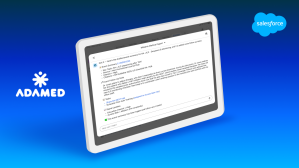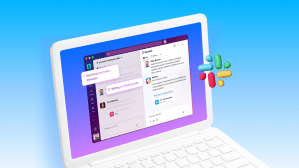What if you could train a digital version of yourself to handle the work tasks you didn’t want to do? Someone that could independently get through the endless pile of work, learning and adapting as they go, after hours and on weekends, without ever getting tired?
This concept, an AI agent, is poised to revolutionize government work, according to Salesforce EVP and GM of Public Sector Nasi Jazayeri.

“Agentic AI is essentially a digital twin of a human role,” said Jazayeri in a recent interview on the Federal Tech Podcast. “This will enable human workers currently putting in 9 to 12 hour days, five days a week, to offload routine and administrative work to digital coworkers, freeing them to shift their focus to higher-value work, like making meaningful connections with constituents.”
Agentic AI is essentially a digital twin of a human role.
Nasi Jazayeri, Salesforce EVP and GM of Public Sector
Why it matters: Government workers face increasing pressure to improve efficiency and service delivery with limited resources. Forty-one percent report experiencing burnout. At the same time, three quarters of constituents expect their online government service experiences to be as user-friendly as those in the private sector.
Agentic AI — a type of AI system that can work seamlessly with human teams to understand and take action on constituent inquiries 24/7 — offers a path to automate complex processes, improve throughput, and alleviate case-worker load. This gives government workers time back to create meaningful human connections with constituents — which Americans report valuing most from their government.

How it works: Jazayeri joined Paul Tatum, EVP and Public Sector Solution Engineering at Salesforce, to highlight how AI agents can significantly improve productivity by automating routine and complex information gathering, including:
- Citizen claims and complaints: AI agents can autonomously perform crucial tasks on behalf of a caseworker, like verifying information, categorizing the complaint based on priority, checking for similar cases, and even suggesting actions.
- “Imagine the productivity gains from having an AI agent do the leg work for you. AI is augmented intelligence — it’s not about replacing people, it’s about augmenting them and creating higher throughput,” said Jazayeri.
- Complex regulations and policies: The Harmonized Tariff Schedule, for example, is an unstructured PDF of more than 4,000 pages with 20,000 different products on it. Using Retrieval-Augmented Generation (RAG), a technique that retrieves contextually relevant information from knowledge sources and incorporates it into AI responses, an AI agent can help a government worker answer complex questions regarding an import, like necessary forms or missing documentation.
- “When I tested Agentforce with a complex avocado import scenario, it was amazing. It flagged errors, like incorrect reference number and missing certificate of origin — details I hadn’t explicitly taught it,” remarked Tatum.
- Eliminating backlogs: Government workers struggle with a significant backlog of work, from applications to claims to inquiries and other pending tasks. By automating the initial processing of many tasks, agentic AI can significantly increase the capacity to handle a large volume of work, essentially helping to “run through the pile” of backlogged tasks much faster than human workers alone.
- “What I hear consistently from my government customers is ‘my workload is a pile. I get 10 things off the pile a day, and 20 more get added.’ If an AI agent can run through the pile overnight, I can come in next morning, and confirm 90% of these are good to go,” said Tatum.
Yes, and: Increased government efficiency benefits not only federal workers but also citizens, resulting in reduced unclaimed benefits, enhanced services, and improved citizen satisfaction — it’s no surprise 87% of Americans said they’d use an AI agent to help them navigate public sector processes.
- Help citizens apply for benefits: AI agents can tackle issues like the estimated $140 billion in unclaimed government benefits by proactively guiding citizens through complex application processes, identifying eligibility, or helping reduce errors that could lead to delays or denials.
- “People are having a hard time realizing they can apply for these claims. It’s very hard to find the information, and very hard to apply for these benefits. With AI assistance, they can find the information far easier, far faster,” said Jazayeri.
- Offer 24/7 availability: Traditional government hours don’t align with everyone’s schedules. Citizens working multiple jobs, attending to family responsibilities, or dealing with shift work often find it challenging to access services during standard business hours. AI agents can provide consistent and reliable support at any time of day or night, ensuring that citizens receive the same quality of service regardless of when they reach out.
- “An agency may have people on staff from 8 a.m. to 8 p.m. five days a week, but if you have babies in the house, you may not be available during that time. One of the benefits of an AI agent is 24/7 availability,” said Jazayeri.
Between the lines: Government organizations are already making strides with AI. The California Department of Motor Vehicles (DMV) was able to reduce the time needed to apply for a REAL ID by 80% using AI and other digital transformation efforts.
What’s next: Salesforce is working to expand the capabilities of Agentforce, its digital labor platform, including FedRAMP High authorization and multilingual support.
Go deeper:
- Learn more about constituent demand for AI agents
- See how the CA Department of Motor Vehicles uses Salesforce to serve more people, faster
- Uncover American attitudes around the agentic AI opportunity for tax filing
- Discover perspectives from the public, civil servants, and IT teams within the public sector organizations in Salesforce’s Connected Government report















